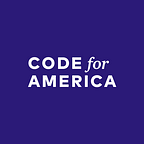Safety and Justice Projects in the Code for America Network
By Jenny Montoya Tansey and Veronica Young
From avoiding jail stays caused by UX problems — not knowing where and when an required appointment is — to welcoming people back after a period of incarceration by connecting them with services, there’s a broad need to apply the best of the digital age to better serve people who interact with the criminal justice system.
Code for America Brigade members from across the country recently came together to share the best work on safety and justice projects and to strategize on redeploying code and best practices.
North Carolina Re-Entry Project
Code for Asheville and Code for Greensboro kicked off the workshop, giving us a deep dive into their product, the North Carolina Re-Entry Project. Their project focuses on providing resources for those who are re-entering their community after incarceration. They pulled together housing, jobs, public benefits, healthcare, legal issues, and reentry support programs for Western North Carolina into one website. Code for Asheville and Code for Greensboro are working with partners like United Way (211), UNC School of government, local non-profits, and reentry experts to gather and maintain data to make sure the project works well for users. Jason Marshall (Brigade Captain of Code for Greensboro) and Eric Jackson (Brigade Captain of Code for Asheville) stressed that they didn’t wanted to just serve their own communities, but their neighbors who may not currently have a Brigade and who may not have these resources in the near future. That way, they’re creating tools that are more inclusive and support our communities as a whole, not just our own micro-communities.
If you want to redeploy this tool or help out the team in North Carolina, visit the Reentry Project Center.
Illinois Reentry Project
The Access to Justice group of Chi Hack Night continued the discussion by displaying their own reentry project, Illinois Reentry Project. Their project provides information on housing, food, employment, health, and legal assistance. On the home page, a visitor is given an option to fill out a four-question form which allows visitors to self select what services they are looking for, where in Illinois they are looking for services, and who they are (whether that be a Veteran, immigrant, their gender, and whether or not they are currently incarcerated). Having a question form for visitors to select their certain needs, allows the website to provide specific and tailored information to the visitor so that they see the services best designed for them. One can also see an entire list of services as well. Kristi Leach (Breakout Group Organizer for Access to Justice) reported that Chi Hack Night started by using resources that were already available, like a resource list/map originally built by DataMade, and aggregating those resources for their project.
Here is Chi Hack Night’s prototype. If you want to fork or contribute, check out this project on GitHub.
CourtBot
Carlos Moreno from Code for Tulsa joined us next to discuss CourtBot, an application that allows folks dealing with civil citations or facing criminal charges. CourtBot sends information and reminders about their cases, keeping people out of jail for failure-to-appear charges or failure-to-pay charges, which can affect people even if they initially only had a parking ticket. Making the relationship between the court system and citizen easier and more functional increases effectiveness of our courts, reduces costs for government and individuals, and keeps people who pose no risk to public safety out of jail.
If you’d like to learn more, check out CourtBot on GitHub.
ClientComm
Next, Manya Scheps, a Code for America Senior Product Manager, walked us through ClientComm, a tool that allows case managers to effectively communicate with their clients who are currently on probation or on pretrial supervision. ClientComm allows case managers to text their clients, for clients to text back, and even allows clients to call their case manager easing the flow of communication and allowing clients to receive reminders about court appearances or ways to follow up on their court ordered treatment. ClientComm, which is currently live in five jurisdictions across the country, aims to reduce recidivism rates by ensuring that clients can easily communicate with their case managers. By showing us a step-by-step tutorial of how the tool works, and seeing in real time how text messages can be sent by case manager to client, and vice versa, our workshop participants were able to see a functioning tool that we have currently deployed, and see yet another way to positively impact the Safety and Justice space.
If you’d like to learn more about ClientComm, see the demo, or talk to us about deploying it in your city, email clientcomm@codeforamerica.org. If you’d like to check out or fork our code, we’re open source on Github!
Clear My Record
Lastly, Tiffany Andrews, a Product Manager at Code for America, presented Clear My Record, a tool that Code for America launched, originally in response to California’s Prop 47, which allows people with past low-level convictions to dismiss or reclassify their convictions to a lesser charge if they have served their time and are working to turn their lives around. Although Prop 47 is law, very few people eligible to clear their records are successful in doing that. Clear My Record aims to fix that. Clear My Record allows people with convictions in 15 counties in California to fill out a simple application to clear their records, and sends it to the relevant counties, and sends emails and texts to people with updates on their eligibility and next steps. Tiffany took us through a step by step process showing the simplicity of filling out an application with Clear My Record, specifically showing an example of a form that we can create that is simple, yet effective to minimize the laborious process many experience when dealing with government related systems.
